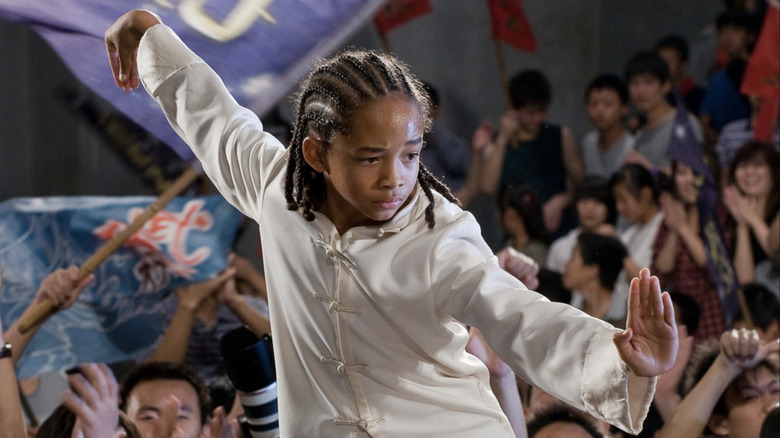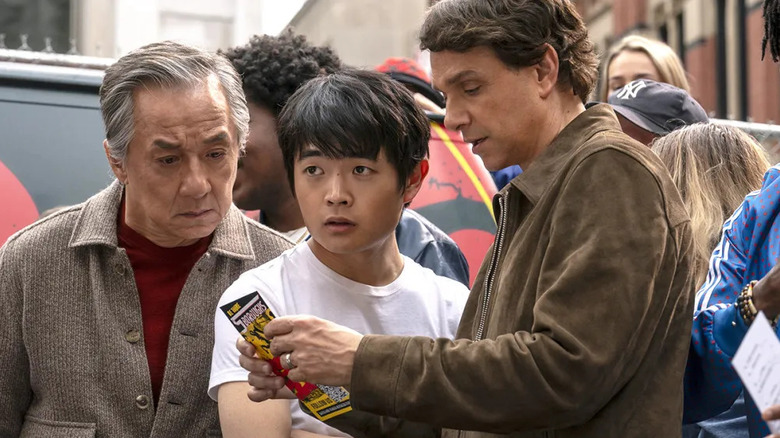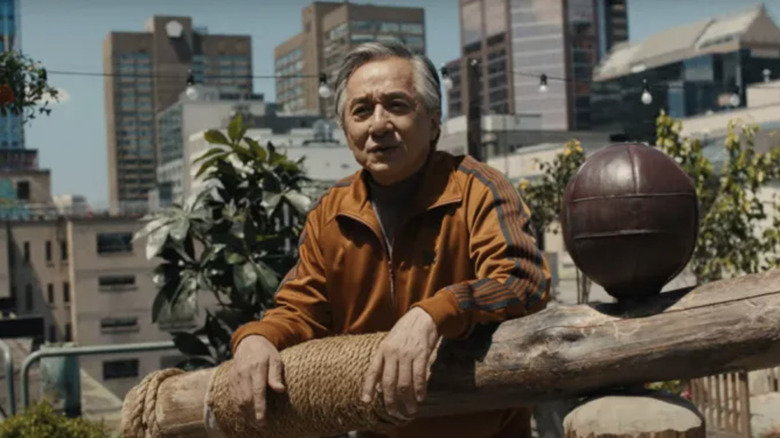Karate Kid: Legends Ignores One Franchise Character Completely (And It's Very Confusing)
When "Karate Kid: Legends" was first announced, the prospect of crossing over 1984's "The Karate Kid" with 2010's "The Karate Kid" seemed heavily involved. Leaving aside the popular six-season run of the series that acts as a sequel to the original four films, "Cobra Kai," the idea felt like it could easily run into some problems, due to the 2010 film being developed and shot as a remake rather than a straight sequel or legacy sequel. Still, there existed some wiggle room: none of the characters shared the same names as their 1984 counterparts, and although the structure and situations involved were highly similar, they weren't so exact as to feel like they could only occur once. In essence, "Legends" would simply have to concede that, in the "Karate Kid" universe, it's a fairly common occurrence for single mothers to pack up their lives and their children and move across the country (or the world), where their kid would run into some bullies, some first love, and some life lessons that could all be addressed by learning martial arts.
Essentially, that's what "Karate Kid: Legends" does, building upon the already established "Gee, it's funny that this has happened again" tone of 1994's "The Next Karate Kid" and going from there. Yet while "Legends" officially connects all the branches of the franchise's tree (even though there still isn't a cameo by Hilary Swank, dammit), it bizarrely omits any mention of one previously important character: Dre Parker, played by Jaden Smith in the 2010 film. While it's certainly true that "Legends" does not feature or namecheck every other major character in the 41-year-old franchise, Dre's absence feels notably confusing.
'Karate Kid: Legends' makes sure to bring the original 'Karate Kid' into continuity
A large part of the reason why Dre not being mentioned or turning up is so strange is that writer Rob Lieber and director Jonathan Entwistle go the extra mile of finding some clarification for the connection between the remake and the original four films. Chinese kung-fu shifu Mr. Han (Jackie Chan) and karate sensei Daniel LaRusso (Ralph Macchio), who learned from his deceased Japanese master, Mr. Miyagi (Pat Morita), are tied together using a scene from "The Karate Kid Part II," one which explains how Miyagi's ancestor developed his style of karate after spending time in China. The ethos of "two branches, one tree" extends throughout the film, explaining how Mr. Han and Daniel can join forces to help Han's grandnephew, Li (Ben Wang), master his already impressive martial arts skills to save his friend's life and livelihood.
While this is the extent of the retconning that occurs in the film, the movie helps further integrate both the 1984 and 2010 movies by allowing Miyagi to have such a spiritual presence in it, one that extends to every generation of master and student: Miyagi and Daniel, Han and Li, Li and Victor (Joshua Jackson), and so on. This idea of the special, unbreakable bond between teacher and student is a major theme of the film and is a longstanding "Karate Kid" franchise trope as well. This is why it's so odd that Mr. Han, who seemed to develop just such a bond with Dre in 2010, doesn't mention him once. Heck, even the otherwise-absent Daniel got an oblique mention in "The Next Karate Kid!"
The character of Mr. Han is very different
There are a couple of possible answers to this oversight. One is that Dre could've been mentioned in a scene shot but deleted from the film. Another is that perhaps the filmmakers wanted to deliberately leave him out of it in hopes of using him excitingly in a future movie; there's no question that "Legends" leaves the door open for a "Karate Kid" cinematic universe of sorts. The most likely answer, however, are the changes in the way Mr. Han is written and depicted in this film. In the 2010 movie, Mr. Han was a morose, antisocial, and bitter man, broken by the untimely death of his wife and child in a car accident, which he inadvertently caused due to his alcohol abuse. Mr. Han's journey in that film, going from such a dark place to becoming the father figure to a troubled and lonely American boy, was one of the best, most moving, and most original aspects of "The Karate Kid" 2010.
In "Karate Kid: Legends," there are absolutely no traces of the old Mr. Han. Jackie Chan seems to almost be playing a different character, one who is, well, not that far removed from the typical, warm, happy-go-lucky Chan screen persona. Make no mistake: it's a fun and engaging performance, and Chan certainly brings his A-game to what he's called upon to do. There's perhaps a bit of the old Han in the way he tenderly but firmly handles both Li and his niece, Li's mother, Dr. Fong (Ming-Na Wen), and some of Chan's dramatic chops can be seen in the flashbacks to Li's traumatic loss of his brother. If one keeps "Karate Kid" 2010 in mind, then the Mr. Han of "Legends" feels like a heartwarming payoff, demonstrating how Mr. Han left his life as a maintenance man behind and used his newfound fame as a kung fu teacher to open his own (and apparently thriving) school.
Yet that only makes it odder that Han never seeks to speak to, involve, or even mention the boy who helped make it all possible for him. Perhaps, should "Legends" start a new cinematic branch of the "Karate Kid" franchise, we'll see or hear from Jaden Smith again. But for now, to paraphrase Eminem, it seems like these folks are acting like they forgot about Dre.
"Karate Kid: Legends" is now playing in theaters everywhere.


